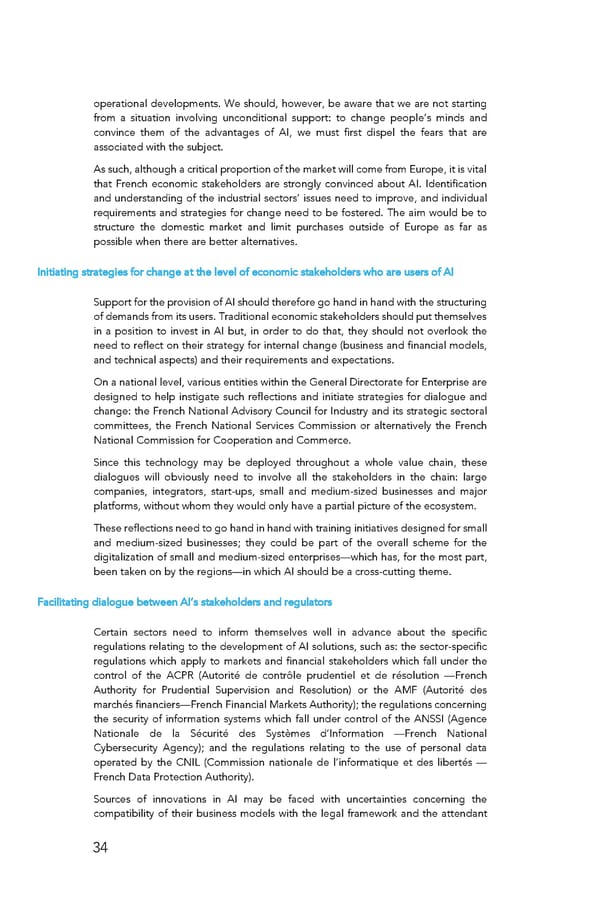operational developments. We should, however, be aware that we are not starting from a situation involving unconditional support: to change people’s minds and convince them of the advantages of AI, we must first dispel the fears that are associated with the subject. As such, although a critical proportion of the market will come from Europe, it is vital that French economic stakeholders are strongly convinced about AI. Identification and understanding of the industrial sectors’ issues need to improve, and individual requirements and strategies for change need to be fostered. The aim would be to structure the domestic market and limit purchases outside of Europe as far as possible when there are better alternatives. Initiating strategies for change at the level of economic stakeholders who are users of AI Support for the provision of AI should therefore go hand in hand with the structuring of demands from its users. Traditional economic stakeholders should put themselves in a position to invest in AI but, in order to do that, they should not overlook the need to reflect on their strategy for internal change (business and financial models, and technical aspects) and their requirements and expectations. On a national level, various entities within the General Directorate for Enterprise are designed to help instigate such reflections and initiate strategies for dialogue and change: the French National Advisory Council for Industry and its strategic sectoral committees, the French National Services Commission or alternatively the French National Commission for Cooperation and Commerce. Since this technology may be deployed throughout a whole value chain, these dialogues will obviously need to involve all the stakeholders in the chain: large companies, integrators, start-ups, small and medium-sized businesses and major platforms, without whom they would only have a partial picture of the ecosystem. These reflections need to go hand in hand with training initiatives designed for small and medium-sized businesses; they could be part of the overall scheme for the digitalization of small and medium-sized enterprises—which has, for the most part, been taken on by the regions—in which AI should be a cross-cutting theme. Facilitating dialogue between AI’s stakeholders and regulators Certain sectors need to inform themselves well in advance about the specific regulations relating to the development of AI solutions, such as: the sector-specific regulations which apply to markets and financial stakeholders which fall under the control of the ACPR (Autorité de contrôle prudentiel et de résolution —French Authority for Prudential Supervision and Resolution) or the AMF (Autorité des marchés financiers—French Financial Markets Authority); the regulations concerning the security of information systems which fall under control of the ANSSI (Agence Nationale de la Sécurité des Systèmes d’Information —French National Cybersecurity Agency); and the regulations relating to the use of personal data operated by the CNIL (Commission nationale de l’informatique et des libertés — French Data Protection Authority). Sources of innovations in AI may be faced with uncertainties concerning the compatibility of their business models with the legal framework and the attendant 34
 For a Meaningful AI - Report Page 34 Page 36
For a Meaningful AI - Report Page 34 Page 36